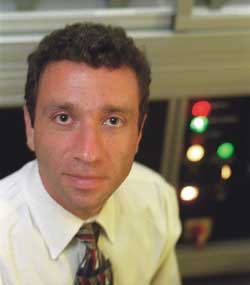![]()
Main Menu ·
Search ·
Current Issue · Contact · Archives · Centennial · Letters to the Editor · FAQs
![]()
Main Menu ·
Search ·
Current Issue · Contact · Archives · Centennial · Letters to the Editor · FAQs

 Photograph by Jon Chase |
DARI SHALON HAS HAD a busy decade. He acquired B.S. and M.S. degrees in engineering and an M.B.A. from MIT, and a Stanford Ph.D.; ran Synteni, a company he created to bring to market the DNA chip technology he coinvented and then licensed from Stanford; and gained the perspective that comes from selling Synteni to a larger firm, integrating their operations, and then quitting early in 1999 to take six months off--his first break since serving in the Israeli Defense Forces in the mid 1980s. He "relaxed" by participating in an off-road Land Rover rally from London to Cape Town and piloting helicopters (he's shopping for a Bell 206). That respite ended this summer, when Shalon returned to Cambridge--upriver from MIT--as director of the new Center for Genomics Research (see "Big Thinking about Science," March-April, page 65). His doctoral work "applied engineering to the life sciences" to enhance the productivity of biological research through a technology that displays the activity of up to 10,000 human genes at a time. Harvard's new center, he says, "is exactly what I do for a living, multidisciplinary research" drawing on fields from biology and physics to chemistry and computational sciences. The aim is to create new genomics tools and apply them to solve problems in areas such as evolution, developmental biology, and cell signaling. The center will do so with the help of post-doctoral fellows, resident for three to five years, mentored by faculty members. Casually clothed, Shalon explains the research program with a soldier's intensity, but he bubbles at the prospect of tackling these issues with "the smartest people in the world."
Main Menu ·
Search · Current Issue · Contact · Archives · Centennial · Letters to the Editor · FAQs
![]()